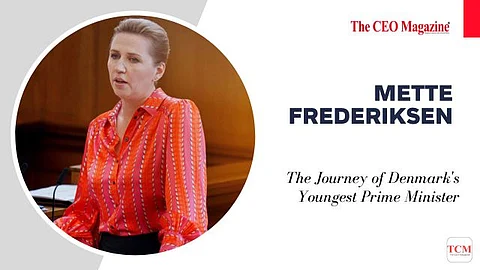
- News
- Women
- Magazine
- IndustryIndustry
- InsightsInsights
- Success Stories
- PublishPublish
- ContactContact
- Media KitMedia Kit

Mette Frederiksen
The Journey of Denmark's Youngest Prime Minister
Mette Frederiksen, born on 19 November 1977, has made a remarkable impact on Danish politics. At the young age of 41, she assumed the role of Prime Minister of Denmark in June 2019, making her the youngest person to hold this prestigious position in Danish history.
Frederiksen is not only celebrated for her achievements but also known for her unwavering dedication to public service. Her estimated net worth is $2.5 million US dollars.
This article takes you through the life, career, and key policies of Mette Frederiksen.
Mette Frederiksen was born in Aalborg, North Denmark, to a typographer father and a teacher mother. As a teenager, she exhibited an early passion for social and environmental causes, campaigning for rainforest preservation, anti-apartheid movements, and whale conservation. These early experiences laid the foundation for her future career in politics.
Frederiksen attended the Aalborghus Gymnasium and later pursued her academic journey at Aalborg University, where she obtained a bachelor's degree in Administration and Social Science. She furthered her education by earning a master's degree in African Studies from the University of Copenhagen.
Frederiksen's political journey began as a youth consultant for LO, the Danish Confederation of Trade Unions. Her entrance into the Danish Parliament, known as the Folketing, occurred in the 2001 general election when she was elected as a representative for Copenhagen County.
Over the years, she held various positions within her party, the Social Democrats, including spokesperson for culture, media, and gender equality. Frederiksen received the Nina Bang Award in 2002 for her political courage and dedication to social causes.
She was instrumental in shaping policies related to early retirement pensions, flex jobs, and reforms in the employment system during her tenure as Minister of Employment.
Her commitment to public service was further recognised when she served as the Minister of Justice from 2014 until she succeeded Helle Thorning-Schmidt as the party leader in 2015, becoming the Leader of the Opposition.
Under Mette Frederiksen's leadership, the Social Democrats experienced a resurgence in the 2015 general election, returning to first place and gaining three additional seats in the Folketing. Frederiksen managed to steer her party back to the left on economic issues while adopting a more conservative stance on immigration.
The pivotal moment in Frederiksen's political career came with the 2019 general election. The Social Democrats won additional seats, and the resulting support from the red bloc of parties allowed her to become the Prime Minister of Denmark, heading an exclusively Social Democratic minority government.
Frederiksen's initial stance on immigration softened, with her government allowing more foreign labour and reversing plans to hold foreign criminals offshore. However, this shift in immigration policies was met with mixed reactions.
One of the most notable controversies during Frederiksen's tenure involved the culling of minks in Denmark due to the risk of COVID-19 infection. This decision, initially hailed as a public health measure, was later deemed illegal. Frederiksen faced criticism for not being aware of the lack of a legal basis for the cull.
Mette Frederiksen gained international attention when she refused to entertain the idea of selling Greenland, an autonomous territory of Denmark, to the United States, leading to the cancellation of a state visit by then-President Donald Trump. Her government also played a role in diplomatic talks regarding the presence of American troops on Danish soil.
Following the 2022 Russian invasion of Ukraine, Frederiksen's government presented the "National Compromise on Danish Security Policy," which included an increase in defence spending, a plan for independence from Russian gas, and a referendum on the Danish EU defence opt-out.
Frederiksen's stance on the European Union, characterised as Eurosceptic by some, led to her campaigning against maintaining the EU defence opt-out in the 2022 referendum. However, her government did reintroduce Denmark's participation in the UN refugee quota system.
In response to the 2022 Nord Stream gas leaks, Frederiksen referred to the incidents as sabotage, emphasising the need for increased surveillance of critical infrastructure and the importance of taking Russian President Vladimir Putin's threats seriously.
In May 2023, Frederiksen's government made the decision to triple Denmark's military spending over the next 10 years, partly funded by the abolition of a public holiday for employees.
Throughout the COVID-19 pandemic, Mette Frederiksen led Denmark's government response. She made headlines for ordering the culling of minks in an effort to curb the spread of the virus. Frederiksen also played a role in establishing a joint research and development fund for COVID-19 vaccines in partnership with Austria and Israel.
In the field of education, Frederiksen's government introduced various reforms, including a new model for distributing gymnasium applicants, which aimed to address issues of ethnic and economic disparity. However, some of these changes were met with significant criticism.
Frederiksen's political positions are characterised by a focus on social policies, concerns about immigration, criticism of globalisation, and efforts to combat climate change. She has worked on initiatives such as the "Law of Children" to prioritise children's well-being and early retirement policies.
Mette Frederiksen has faced several controversies and criticisms during her political career, including her daughter's education at a private school, incorrect information about unemployment benefit recipients, and her government's handling of the repatriation of Danish citizens from Syrian refugee camps.
In her personal life, Mette Frederiksen has two children from her first marriage and, in July 2020, married her longtime boyfriend, Bo Tengberg, a film director.
Mette Frederiksen's rise to become Denmark's youngest prime minister is a testament to her dedication to public service and her ability to lead through complex issues and challenging situations.
Her policies, decisions, and controversies have left an indelible mark on Danish politics, shaping the nation's future in various ways. As she continues her tenure, Denmark and the world watch closely to see the legacy she leaves behind.
Follow us on Google News
